Understanding the Metaverse: How Virtual Office Spaces are Revolutionizing Work
The concept of the metaverse has been stirring waves across the tech world as an immersive virtual reality realm where people can interact, socialize, and conduct business. At its core, the metaverse is a collective virtual shared space, created by the convergence of virtually enhanced physical and digital reality. It is persistent, providing a sense of real-time continuity for its users. In this transformative landscape, virtual office spaces have emerged as a game-changing element for working professionals globally.
The Emergence of Virtual Office Spaces
Virtual office spaces can be thought of as the professional sectors of the metaverse. Remote work trends, accelerated by the global pandemic, have necessitated the development of these spaces. Companies are thinking outside the traditional office paradigm to increase efficiency, foster collaboration, and attract global talent. Virtual office spaces encapsulate the idea of a workplace detached from physical constraints, allowing employees to connect from anywhere, at any time.
Benefits of Virtual Workspaces in the Metaverse
- Increased Productivity: By eliminating commutes and providing tools that assist in organizing tasks, virtual offices have shown a remarkable improvement in productivity.
- Flexible Work-Life Balance: Professionals are granted the ability to structure their work schedules in harmony with their personal lives, leading to enhanced well-being.
- Global Talent Pool: Businesses are no longer limited by geography. They can attract and retain talent from across the globe thanks to the ubiquitous nature of virtual office spaces.
- Environmental Impact: With fewer physical offices and commutes, the virtual workplace significantly reduces carbon footprints, contributing to sustainability efforts.
Integrating Advanced Technologies
Virtual office spaces leverage state-of-the-art technologies such as artificial intelligence, virtual reality (VR), and augmented reality (AR) to replicate and enhance traditional office environments. VR headsets and AR glasses provide immersive experiences, simulating physical presence within the virtual office. This is complemented by AI-driven productivity tools that streamline administrative tasks and foster collaboration among teams spread across different time zones.
Choosing the Right Virtual Office Space in the Metaverse for Your Team
Understanding the Metaverse and Its Office Spaces
Before diving into the selection process, it’s crucial to understand what the Metaverse is. Envision a virtual world where your team can interact, create, and share experiences in real-time, irrespective of physical location. In the Metaverse, virtual office spaces are not merely digital desks and chairs but immersive environments that can foster collaboration and innovation. These spaces are designed to simulate the dynamics of a physical office, enhancing the remote work experience and driving productivity.
Benefits of a Metaverse Office Space
Transitioning to a virtual office space in the Metaverse means your team can take advantage of flexible environments, tailored to suit your company’s culture and work style. From customizable meeting rooms to interactive whiteboards, these spaces provide tools that enrich communication and enable collaborative projects. Moreover, the Metaverse offers a unique opportunity for branding, allowing you to create an office that truly represents your company’s identity.
Key Factors to Consider When Selecting a Metaverse Office
With myriad options available, choosing the right virtual office space can seem daunting. Start by identifying your team’s needs and how a virtual office can meet them. Evaluate factors such as the size of your team, the nature of your work, the level of collaboration required, and the need for privacy or public access. Moreover, considering the technological requirements and compatibility with your team’s devices is essential to ensure a seamless integration.
Technology and Compatibility
Ensure that the virtual office platform you choose supports various devices and has a low barrier to entry. User-friendliness is key – your team should be able to navigate the space without extensive training. Check for integration capabilities with your existing software and the potential for scalability as your team grows. Security is also paramount, so look for features that protect corporate data and user privacy within the Metaverse.
Maximizing Team Performance in Virtual Office Spaces
Selecting the ideal virtual office space is just the first step. Once set up, it’s vital to maximize its potential to boost team performance. Encourage your team to personalize their avatars and spaces, fostering a sense of ownership and comfort. Regularly organize virtual events and meetings to facilitate team bonding and maintain strong communication. Additionally, incorporating virtual reality (VR) components can take the experience to another level, offering an even more immersive collaborative environment.
Productivity Tools and Analytics
Look for virtual office spaces that offer integrated productivity tools such as task managers, time tracking, and progress analytics. These features can help keep your team on track and provide insights into workflow and efficiency. Consider spaces that allow for easy reporting and data visualization, enabling you to make informed decisions and improve team performance over time.
By understanding your needs, evaluating critical factors, and utilizing the office space effectively, your team can thrive in the Metaverse. With the right virtual office space, the possibilities for growth and innovation are boundless.
Enhancing Productivity and Collaboration through Metaverse Office Spaces
Evolution of Workspaces: From Physical to Virtual Realities
The concept of traditional office environments has been profoundly reimagined with the advent of the metaverse. Elevating the work experience beyond geographical restrictions, Metaverse Office Spaces offer unique and innovative platforms for businesses to thrive. These virtual environments promise a new realm of possibilities, from personalized avatars to three-dimensional workstations, engendering a workspace unconstrained by the physical world.
Setting Up Your Digital Domain
Establishing a presence in the metaverse commences with designing a virtual space that mirrors your company’s culture and ethos. It’s a process that involves selecting the environment, customizing interiors, and ensuring the workspace is equipped with tools and features conducive to productivity. The onboarding of employees is a blend of technical acclimatization and cultural assimilation, guiding them through the nuances of virtual collaboration.
Driving Team Engagement in Metaverse Workspaces
In the metaverse, fostering a sense of team spirit and engagement transcends the limitations of physical distance. Interactive meeting rooms, digital whiteboards, and real-time brainstorming sessions manifest collaboration seamlessly. Virtual team-building activities are organized in diverse settings, enabling colleagues to connect and engage through experiences that were once confined to the physical world.
Immersive Collaboration Tools
Collaboration in the metaverse is substantially enhanced by a suite of immersive tools designed to facilitate communication and teamwork. These tools range from virtual reality conferencing systems to augmented reality project planning platforms, each contributing to a more connected and immersive work experience. Employees can share ideas and strategies as if they were in the same room, breaking the shackles of conventional video calls and email chains.
The Future of Productivity in a Virtual Era
The metaverse offers an unprecedented avenue for productivity with its flexible and customizable workspaces. The integration of AI assistants, data analytics, and automated processes within these spaces ensures that repetitive tasks are minimized, allowing employees to focus on creative and strategic roles. This advancement ushers in a new era where productivity is not just about working harder, but smarter.
Analytics-Driven Workspaces
Within the metaverse, data-driven approaches to workspace management and employee performance are easily achievable. Real-time analytics provide insights into workflow efficiencies, while also identifying areas for improvement. By leveraging the metrics gathered, companies can fine-tune their operations, leading to optimized work processes and, consequently, higher productivity levels.
Real-World Success Stories: Businesses Thriving in Metaverse Office Spaces
Recent developments in virtual reality have given rise to the concept of the Metaverse – a collective virtual shared space where businesses are exploring new frontiers of operation. The idea of a Metaverse office space has evolved from a speculative fiction to a real-world solution for companies around the globe. This revolutionary change is redefining the ways in which teams collaborate and how companies operate.
Increased Productivity in Virtual Work Environments
The Metaverse has paved the way for office spaces that are not bounded by physical limitations, thus offering an innovative and interactive workplace environment. Companies report an uptick in productivity when their employees engage in these virtual settings. The seamless integration of tools and resources in the Metaverse means that information is more accessible and collaboration is no longer restricted by geography.
For example, a leading tech company has recently launched its virtual headquarter in the Metaverse, providing employees the freedom to design their personal workstations. This has reportedly led to a 20% increase in employee efficiency and a significant drop in operational costs. Spaces can be customized to fit the task at hand, whether it be a serene environment for deep work or a meeting room equipped with interactive 3D models for client presentations.
Networking and Collaboration Beyond Boundaries
The Metaverse has negated the concept of borders when it comes to networking and collaboration. International conferences and meetings are now more inclusive and engaging, helping businesses to expand their reach and partnership potentials. A renowned marketing firm experienced a 35% growth in international client acquisition after embracing Metaverse offices for their global strategy meetings, underscoring the considerable benefits of these virtual spaces.
- Accessibility for global participants without the need for travel
- Engaging and interactive sessions with real-time data and analytics
- Facilitating cross-cultural exchanges and understanding
Sustainable Operations with Metaverse Offices
The shift to Metaverse office spaces also highlights sustainability benefits. Companies are seeing a reduction in their carbon footprint as the need for large physical offices and the associated energy consumption declines. Not only does this contribute to a healthier planet, but it also aligns with the corporate responsibility goals of many organizations.
By leveraging virtual office environments, businesses can continue to thrive while being socially and environmentally conscious. Case studies show that firms with Metaverse offices have witnessed a reduction in operational costs by 25%, owing to savings on utilities, space, and commuting expenditures. Such cost efficiency, coupled with environmental stewardship, presents a compelling case for the continued adoption of Metaverse workspaces.
Future Trends: The Evolving Landscape of Virtual Workspaces in the Metaverse
The Emergence of Virtual Workspaces in the Metaverse
In recent years, the concept of a virtual workspace has taken center stage, manifesting as a cornerstone of modern employment and collaboration. As we cruise through the digital age, it is essential to explore how these workspaces are evolving, particularly within the rapidly-expanding realm of the metaverse. This blog post examines the future trends that are shaping the landscape of virtual workspaces and how they interact with the metaversal ecosystem.
Integration of Advanced Virtual Reality (VR) Technologies
At the forefront of this evolution is the integration of cutting-edge Virtual Reality (VR) technologies. VR is poised to transport professionals into fully immersive, three-dimensional work environments, offering an unparalleled sense of presence and interaction. Here’s a peek into how VR is redefining the workplace:
Immersive Collaboration Platforms
- Platforms like Spatial and AltspaceVR are setting the standard for VR-based meetings, enabling avatars to interact naturally in a shared digital space.
- These virtual environments are equipped with tools to facilitate real-time collaboration, brainstorming, and project development.
Enhanced Training and Simulation
- VR workspaces allow for highly realistic training simulations, essential for sectors like healthcare, where hands-on experience is crucial.
- Simulations can replicate complex scenarios that would be expensive or dangerous to recreate in the physical world.
Virtual Offices and Customization
- The metaverse enables the creation of personalized virtual offices, tailored to individual or company preferences.
- These spaces offer flexibility and creativity, as they can be easily modified to suit different tasks or mood settings.
Decentralization and Blockchain in the Virtual Workplace
Another significant trend is the rise of decentralization and the integration of blockchain technology in the virtual workplace. The metaverse is not just a single entity but a collection of interconnected spaces, many of which are built on decentralized networks. This allows for:
Sovereignty Over Digital Assets
- Blockchain enables workers to have true ownership of their digital assets and creations, secured by cryptographic proofs.
- Decentralization guarantees that assets can be transferred or sold across platforms without the need for intermediaries.
Trust and Transparency
- Blockchain fosters trust amongst participants by providing a transparent and immutable ledger of transactions and interactions within the virtual workspace.
- It is instrumental in creating verifiable digital identities and reputations that carry weight across various metaverse platforms.
Streamlined Payments and Smart Contracts
- Cryptocurrencies and smart contracts facilitate immediate, cross-border payments and contractual agreements.
- These technologies enable automated payment systems for freelancers and contractors operating within the metaverse.
Interconnectivity and the Future of Work
Interconnectivity is a crucial element of the metaverse’s appeal, offering seamless transitions between different virtual workspaces and real-life applications. This interconnected ecosystem provides:
Unified Communication Systems
- Interoperability among different platforms is key, with messaging and communication protocols that allow for consistent, cross-platform interactions.
- Virtual workspaces aim to integrate with existing tools and services to maintain continuity and efficiency.
Hybrid Events and Conferences
- The metaverse is an ideal venue for hosting hybrid events, combining both virtual and physical participation.
- These events can cater to global audiences, reducing travel costs and environmental impact.
Exclusive Metaverse Engagements
- With the metaverse, opportunities for exclusive engagements and networking events are on the rise.
- Organizations can create unique, branded experiences that were previously unimaginable.
The virtual workspaces of the future are brimming with potential, and as they become increasingly integrated with the metaverse, we can expect unparalleled growth in the way we connect, collaborate, and create. These developments promise not only a transformation in the landscape of work but also a new chapter in the narrative of digital interactivity and community.

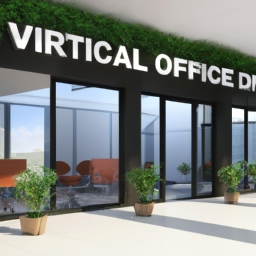
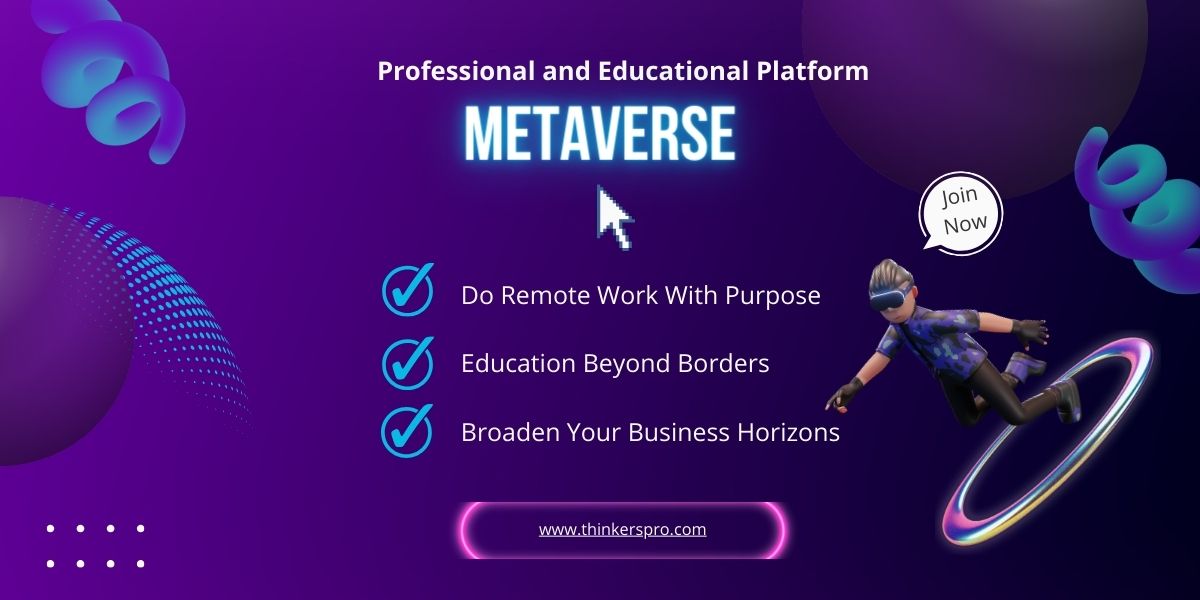


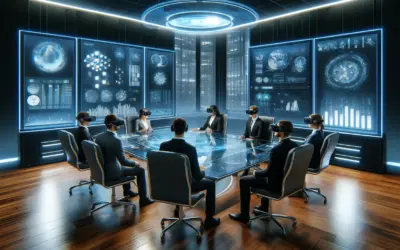

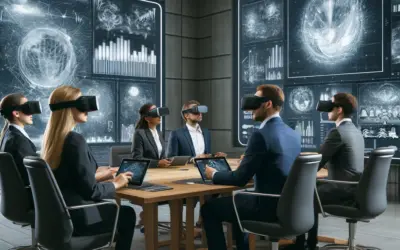

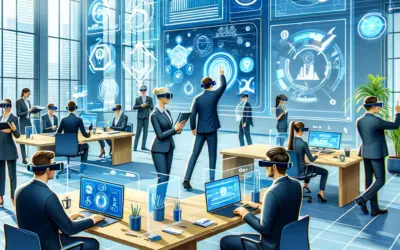



0 comentarios